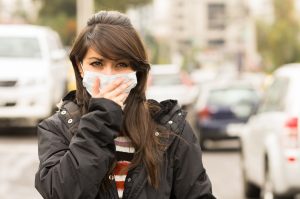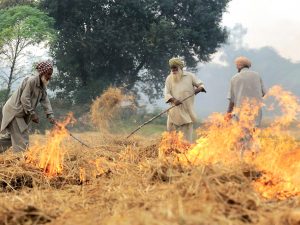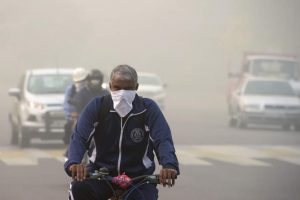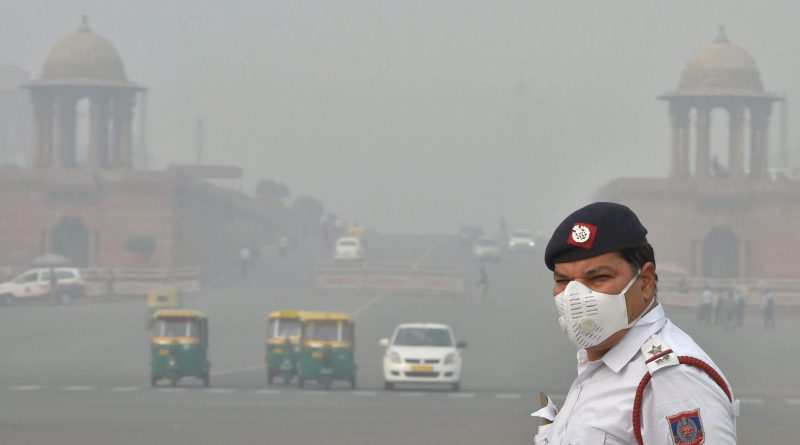Gasping for Breath
Dust from construction work, burning of waste in the open, unchecked vehicular pollution, stubble burning in the neighbouring states, are some of the factors that combine to serve a heady noxious cocktail to the residents of Delhi
By Shankar Sengupta and Yogita Ahuja
Delhi, the capital of India, has a charm of its own. But, the all-pervasive air pollution in the city is taking its toll. Children are the worst affected. A colleague recently decided to quit a well-paid job in the metro after the recurring cough of his only child refused to go away. His doctor said his child was sensitive to the high level of pollution present in the city’s air. He has since relocated to a town near the foothills of the Himalayas and the cough of his child is a thing of the past. Children are more prone to respiratory diseases as they lead active lives and breathe in greater volumes of polluted air. Compared to an adult, their immune systems too are not as well developed. The poor air quality during winters in Delhi contains poisonous pollutants which attack the immune system, reduce the lung capacity and increase the risk of lung cancer, asthma, respiratory infections and early death.

Air pollution in Delhi routinely makes newspaper headlines every winter. The causes of air pollution are many: dust from construction work, burning of waste in the open and the unchecked vehicular pollution. Fire crackers burst during Diwali festivities add to the smog. Also smoke from stubble burning in the neighbouring states drifts to Delhi and adds to the already heavy particulate matter. The humidity in the air during the winter months along with low surface wind speed combine to serve a heady noxious cocktail to the residents of the city. No wonder the sale of air purifiers are peaking in Delhi.
In an interesting experiment, an NGO recently placed a replica of human lungs which could replicate breathing outside a well-known hospital. It blackened in two days. Experts say that breathing the polluted Delhi air is like smoking two cigarettes a day. Both acute and chronic effects of air pollution can be seen on people’s health which affects the human system and its multiple organs. Many citizens of Delhi are affected with acute bronchitis, minor upper respiratory irritation to chronic respiratory and heart disease, lung cancer, acute respiratory infections in children and chronic bronchitis in adults, aggravating pre-existing heart and lung disease, or asthmatic attacks and other severe respiratory infections. Unless, stringent measures are taken to combat the increase in air pollution, the queues of patients outside the Departments of Pulmonary Medicine in city hospitals are bound to become longer and longer.

Effect of Air Pollution on Health: Research Studies
During winters, Delhi routinely tops the list of the most polluted cities in the world. Recently a study has highlighted that air pollution not only leads to respiratory problems and cardiovascular diseases but also affects the eyes. Says Dr Rahul Nagpal, director and head, department of pediatrics at Fortis Flt. Lt. Rajan Dhall Hospital, New Delhi in an article entitled ‘Health, gone in a breath’ published in the ‘The Week’ magazine, “Studies have proved that children exposed to air pollution developed Vitamin D deficiency as adults. There is also a strong co-relation between air pollution and cognitive and mental retardation.”
According to the World Health Organization (WHO) report titled “Air Pollution and Child Health” more than one lakh children below five years of age in India died due to exposure to outdoor and indoor PM2.5 pollutants in the year 2016. The WHO study found that India has one of the highest death rates due to acute lower respiratory infections among children below 5 years.
Particulate Matter and Human Health
Numerous studies have linked exposure to particulate matter (PM) to a number of conditions – although the size of particulate matter determines its potential to cause health problems.
Air pollution cuts the average lifespan of people around the globe by almost two years
Dr. Tedros Adhanom Ghebreyesus, General Director of WHO said air pollution is the “new tobacco”. “Despite this epidemic of needless, preventable deaths and disability, smog of complacency pervades the planet”, he remarked.
The air quality index get converted from moderate to hazardous.

Smart Tips to combat Delhi’s poor air quality
Stay indoor
Use air purifiers
Try breathing exercises: Do Anulom Vilom Pranayama, Surya Kriya etc.
Take steam therapy
Take a hot shower
Use indoor plants like Areca Palm, Sansevieria, Snake Plant or the Mother-in-Law’s Tongue, and Money Plant. Plants are inexpensive and a low cost air purifying solution.
Purify your car air
Take herbal drinks: Green tea, Ginger tea, hone & lemon tea, beetroot, aamla & carrot juice.
Wash sheets and stuffed toys to get rid of dust mites.
Wear good quality masks when going out: Health experts suggest N95/N99/FFP3 or ‘NIOSH Approved’ masks that filter out more than 95% of particles (larger than 0.3 microns).
Engineers from IIT Delhi have invented Pollution Net which is a nano fiber mesh that will help with indoor pollution by preventing the entry of pollutants inside homes. Its low cost filter which can screen particles of size PM2.5. The filter may soon become commercially available.
Turmeric powder has anti bacterial activity. It can be added in your food & milk.
Wear protective eyeglasses and shades.
Wash your eyes thoroughly with clean, running water every morning, after reaching home from school/college/work and before going off to sleep.
Use lubricating eye drops prescribed by eye specialists.
Conclusion
In view of above-mentioned studies, it has been proved that the impact of air pollution on human health is very harmful for all age groups. We need to proactively fight the effects of pollution to stay healthy. We need to remember that along with intake of right diet, we should lead a happy, cheerful and stress free life. We can use good quality masks (N95), air filters and fix PM 2.5 filters on our windows and doors. Plants are once again our best bet. We need to plant more trees, and use air purifying indoor plants. We should take care to clean the leaves of the air purifying plants to rid them of dust and enhance their air purifying ability. So, take good care of your environment and in turn the environment will take good care of you.
(The authors are from Delhi Pharmaceutical Sciences and Research University, Delhi)

